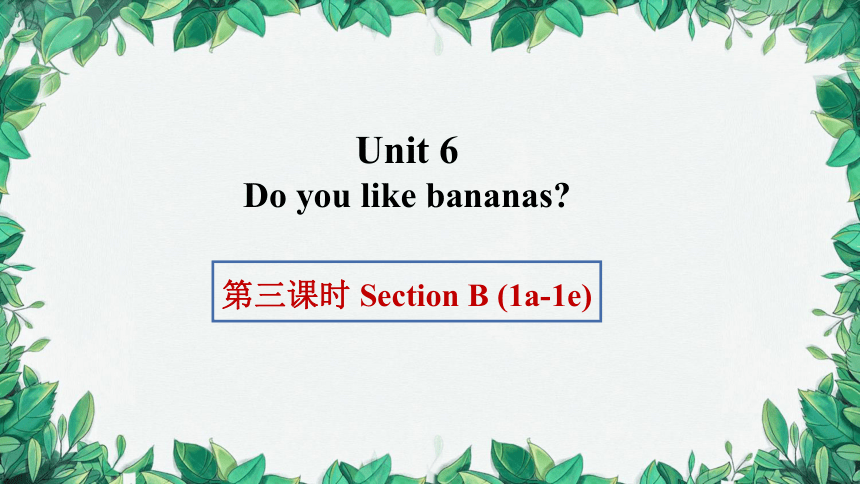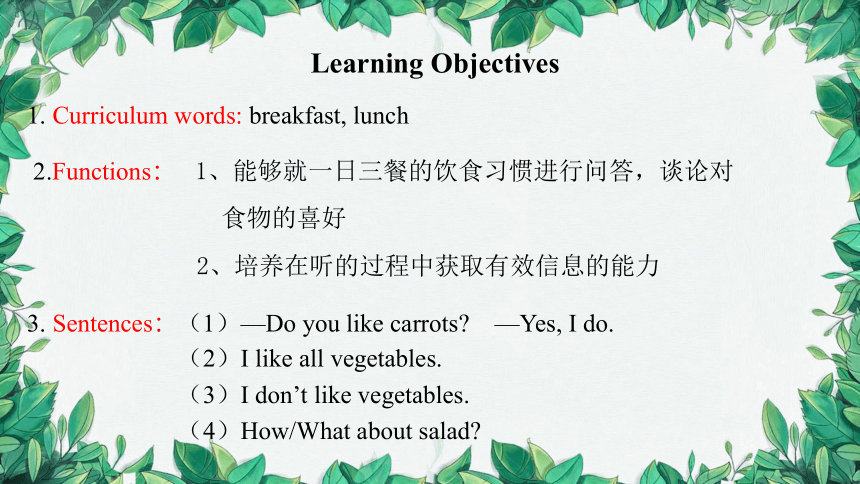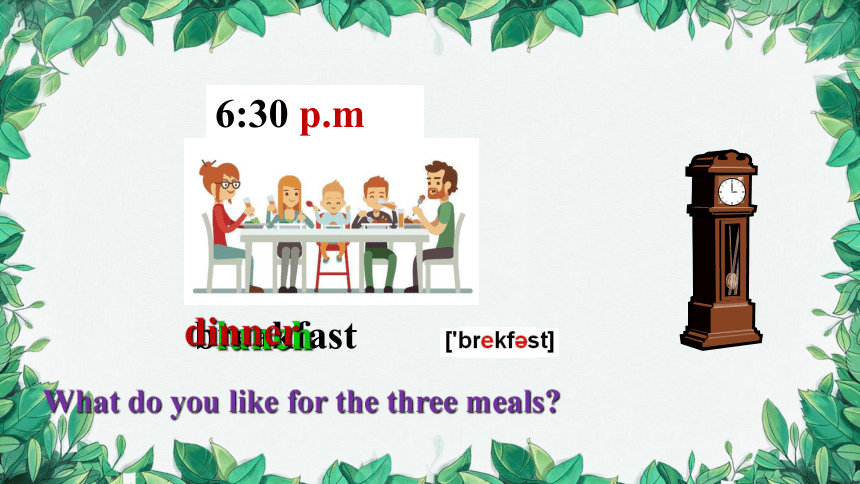Unit 6 Do you like bananas第三课时Section B (1a-1e)课件+嵌入音视频(共18张PPT)
文档属性
| 名称 | Unit 6 Do you like bananas第三课时Section B (1a-1e)课件+嵌入音视频(共18张PPT) |  | |
| 格式 | pptx | ||
| 文件大小 | 34.3MB | ||
| 资源类型 | 教案 | ||
| 版本资源 | 人教新目标(Go for it)版 | ||
| 科目 | 英语 | ||
| 更新时间 | 2023-08-10 12:30:32 | ||
图片预览







文档简介
(共18张PPT)
Unit 6
Do you like bananas
第三课时 Section B (1a-1e)
Learning Objectives
1. Curriculum words: breakfast, lunch
2.Functions: 1、能够就一日三餐的饮食习惯进行问答,谈论对
食物的喜好
2、培养在听的过程中获取有效信息的能力
3. Sentences:(1)—Do you like carrots —Yes, I do.
(2)I like all vegetables.
(3)I don’t like vegetables.
(4)How/What about salad
Warm-up
____________
Leading in
tomato
hamburger
orange
salad
____________
____________
____________
____________
____________
banana
bread
milk
____________
____________
apple
ice-cream
strawberry
vegetable
pear
____________
____________
____________
____________
fruit
____________
breakfast
lunch
dinner
7:00 a.m
12:10 a.m
6:30 p.m
What do you like for the three meals
Write the number of each word next to the correct food.
1. orange 3. eggs 5. ice-cream 7. banana 9. rice
2. salad 4. apple 6. hamburger 8. chicken 10. carrots
1a
3
4
7
10
6
1
2
9
8
5
Pre-listening
1b
How many other words can you add to the lists
fruit:______________________________________________________________________________________
vegetables: ___________________________________
_____________________________________________
pear,
carrot,
onion,
mushroom
tomato,
orange,
watermelon,
apple,
strawberry,
banana,
potato,
grape,
1c
Listen and circle the food you hear in 1a.
1. orange 3. eggs 5. ice-cream 7. banana 9. rice
2. salad 4. apple 6. hamburger 8. chicken 10. carrots
Listening
1d
Listen again. Fill in the chart.
Likes Doesn't like
Tom carrots,
Sally
salad
all vegetables,
apples
salad,
fruit (including bananas,
oranges, apples),
ice-cream
vegetables (except for salad)
Sally: Do you like carrots
Tom: Yes, I do. I like all vegetables.
Sally: How about salad Do you like salad
Tom: Yes, I do. It’s great! Do you like vegetables
Sally: No, I don’t like vegetables. Well, only salad. But I like fruit.
I like bananas, oranges...
Tom: How about apples I don’t like apples!
Sally: Yes, I like apples. And you know what I really like
Tom: What
Sally: Ice-cream!
1e
Ask and answer questions about what Sally and Tom like and don’t like.
Practice
Language points
1.breakfast ,lunch
表示一日三餐的词前面一般不用冠词,常与have 构成短语
have breakfast/lunch/dinner 意为“吃早饭/午饭/ 晚饭”。
表示一日三餐的词前面有形容词修饰时,通常加不定冠
词a 或an。
e.g. have a good dinner
吃一顿丰盛的晚餐
一、单项选择
1.I usually have _____ breakfast at home. I think it’s good for my health .
A. a B. an C. the D. /
2. _____ like oranges.
A. He and I B. I and he C. He and me D. I and him
3.My cousin oranges and I pears.
A. like; like B. like; likes C. likes; likes D. likes; like
Exercises
4. Let’s ________ the football match.
A. going and watch B. go to watch
C. go and watching D. go and to watch
5.—______ John like carrots
—Sorry, I ________ know.
A. Does; do B. Do; doesn’t C. Do; don't D. Does; don’t
6.We need some ________ every day.
A. vegetable B. meats C. milks D. healthy food
二、根据汉语意思及括号内所给词的适当形式填空
1. _________ (早餐) is important to you.
2. What does Sally eat for _________ (午餐)
3. Do they like ________ (carrot)
4. Jack and his brother _________ (not like) apples.
5. —Does your sister like popular songs
—No, she _________ (not).
doesn’t
don’t like
carrots
lunch
Breakfast
Summary
Fruits and vegetables are good for our health.
Homework
Preview the passage in Section B 2b.
Make a dialogue about what you and your parents like and don't like.
Unit 6
Do you like bananas
第三课时 Section B (1a-1e)
Learning Objectives
1. Curriculum words: breakfast, lunch
2.Functions: 1、能够就一日三餐的饮食习惯进行问答,谈论对
食物的喜好
2、培养在听的过程中获取有效信息的能力
3. Sentences:(1)—Do you like carrots —Yes, I do.
(2)I like all vegetables.
(3)I don’t like vegetables.
(4)How/What about salad
Warm-up
____________
Leading in
tomato
hamburger
orange
salad
____________
____________
____________
____________
____________
banana
bread
milk
____________
____________
apple
ice-cream
strawberry
vegetable
pear
____________
____________
____________
____________
fruit
____________
breakfast
lunch
dinner
7:00 a.m
12:10 a.m
6:30 p.m
What do you like for the three meals
Write the number of each word next to the correct food.
1. orange 3. eggs 5. ice-cream 7. banana 9. rice
2. salad 4. apple 6. hamburger 8. chicken 10. carrots
1a
3
4
7
10
6
1
2
9
8
5
Pre-listening
1b
How many other words can you add to the lists
fruit:______________________________________________________________________________________
vegetables: ___________________________________
_____________________________________________
pear,
carrot,
onion,
mushroom
tomato,
orange,
watermelon,
apple,
strawberry,
banana,
potato,
grape,
1c
Listen and circle the food you hear in 1a.
1. orange 3. eggs 5. ice-cream 7. banana 9. rice
2. salad 4. apple 6. hamburger 8. chicken 10. carrots
Listening
1d
Listen again. Fill in the chart.
Likes Doesn't like
Tom carrots,
Sally
salad
all vegetables,
apples
salad,
fruit (including bananas,
oranges, apples),
ice-cream
vegetables (except for salad)
Sally: Do you like carrots
Tom: Yes, I do. I like all vegetables.
Sally: How about salad Do you like salad
Tom: Yes, I do. It’s great! Do you like vegetables
Sally: No, I don’t like vegetables. Well, only salad. But I like fruit.
I like bananas, oranges...
Tom: How about apples I don’t like apples!
Sally: Yes, I like apples. And you know what I really like
Tom: What
Sally: Ice-cream!
1e
Ask and answer questions about what Sally and Tom like and don’t like.
Practice
Language points
1.breakfast ,lunch
表示一日三餐的词前面一般不用冠词,常与have 构成短语
have breakfast/lunch/dinner 意为“吃早饭/午饭/ 晚饭”。
表示一日三餐的词前面有形容词修饰时,通常加不定冠
词a 或an。
e.g. have a good dinner
吃一顿丰盛的晚餐
一、单项选择
1.I usually have _____ breakfast at home. I think it’s good for my health .
A. a B. an C. the D. /
2. _____ like oranges.
A. He and I B. I and he C. He and me D. I and him
3.My cousin oranges and I pears.
A. like; like B. like; likes C. likes; likes D. likes; like
Exercises
4. Let’s ________ the football match.
A. going and watch B. go to watch
C. go and watching D. go and to watch
5.—______ John like carrots
—Sorry, I ________ know.
A. Does; do B. Do; doesn’t C. Do; don't D. Does; don’t
6.We need some ________ every day.
A. vegetable B. meats C. milks D. healthy food
二、根据汉语意思及括号内所给词的适当形式填空
1. _________ (早餐) is important to you.
2. What does Sally eat for _________ (午餐)
3. Do they like ________ (carrot)
4. Jack and his brother _________ (not like) apples.
5. —Does your sister like popular songs
—No, she _________ (not).
doesn’t
don’t like
carrots
lunch
Breakfast
Summary
Fruits and vegetables are good for our health.
Homework
Preview the passage in Section B 2b.
Make a dialogue about what you and your parents like and don't like.
同课章节目录
- starters 预备篇(2012秋审查)
- Unit 1 Good morning !
- Unit 2 What’s this in English?
- Unit 3 What color is it ?
- Unit 1 My name's Gina.
- Section A
- Section B
- Unit 2 This is my sister.
- Section A
- Section B
- Unit 3 Is this your pencil?
- Section A
- Section B
- Unit 4 Where's my schoolbag?
- Section A
- Section B
- Unit 5 Do you have a soccer ball?
- Section A
- Section B
- Unit 6 Do you like bananas?
- Section A
- Section B
- Unit 7 How much are these socks?
- Section A
- Section B
- Unit 8 When is your birthday?
- Section A
- Section B
- Unit 9 My favorite subject is science.
- Section A
- Section B
